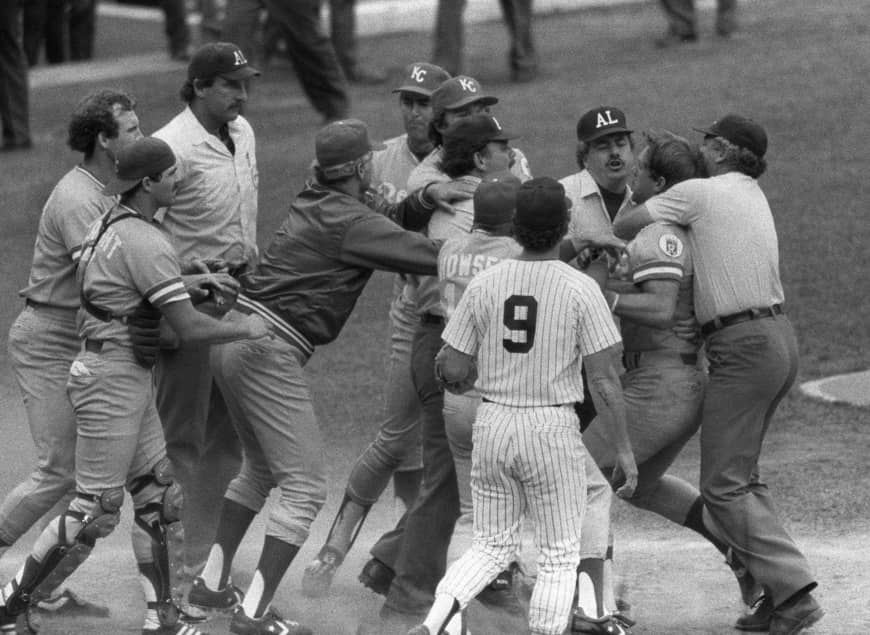
KANSAS CITY, MISSOURI – Nearly three decades ago, Kansas City Royals star George Brett raced out of the visiting dugout at Yankee Stadium and got in the face of rookie umpire Tim McClelland, instantly transforming what had been a run-of-the-mill regular-season game in mid-July into an iconic moment in baseball history.
It became known as “The Pine Tar Game.” And now, baseball fans can own a piece of the history.
Later this month, a trove of artifacts connected to the seminal game between the Royals and New York Yankees will be sold by Heritage Auctions. The highlight will be the jersey worn by Brett and expected to fetch more than $100,000, but nearly every other significant piece from that game — except the bat, which is at the National Baseball Hall of Fame and Museum in Cooperstown, New York — is on the auction block with the sale set to end the weekend of Feb. 22.
The game took place July 24, 1983, and the Royals were trailing 4-3 with two outs in the ninth inning. U.L. Washington was on first base when Brett connected off Goose Gossage and seemingly gave Kansas City the lead. That’s when Yankees manager Billy Martin ambled out of the dugout, approached Tim McClelland and asked that Brett’s bat be examined.
Brett was known for using plenty of pine tar to improve his grip, and McClelland decided the amount on his bat exceeded what was allowed by rule. He nullified the home run, called Brett out and that gave the Yankees the win.
That sent Brett into a rage, and he had to be physically restrained by Royals manager Dick Howser and several others. The team lodged a protest and American League President Lee MacPhail upheld it, ordering the game to be continued from the point of Brett’s home run on Aug. 18. The Royals wound up holding on for the win.
“It’s just such a glorious freak out,” said Chris Ivy, director of sports memorabilia for Heritage Auctions, one of the world’s largest sports memorabilia and collectibles auctioneers. “If you had a video of any famous person losing his or her mind so profoundly, it would ‘go viral,’ as the kids say. That kind of passion and anger is universally recognized as fascinating.
“You could show that video to an uncontacted tribe deep in the Amazon,” Ivy added, “and they’d be interested.”
Brett signed and inscribed his powder-blue jersey with “The Pine Tar Game” and the date. The ball hit by Brett for the home run is signed by both the Hall of Fame third baseman and Gossage. Brett signed another ball used to complete the game, while a letter written by MacPhail years later explaining his decision to uphold the Royals’ protest of the game is also up for auction.
Those connected to the Royals — who begin reporting to spring training in Arizona this week — still point to “The Pine Tar Game” as one of the iconic moments in the organization’s history, on par with World Series championships in 1985 and 2015.
“It’s because George is the greatest player ever — greatest player for the Royals,” said outfielder Alex Gordon, the team’s longest-tenured player. “If you saw him play and saw his energy and that fire he played with, that (event) shows that. He hit the home run and then got thrown out. That energy was typical George. It’s the iconic play for the Royals.”
Asked why the game remains such a moment in history, current general manager Dayton Moore said: “I think it has to do with the passion of the situation. It became an event because of George’s passion to find a way to win for his team.”
For years, the artifacts were owned by Barry Halper, a good friend of Brett and perhaps the biggest baseball memorabilia collector in history. Halper ultimately sold his collection at auction in the late 1990s for more than $20 million, and the pieces from “The Pine Tar Game” have been owned by a private collector until the present day.
The jersey is expected to fetch six figures.
“It’s the most famous moment of the most famous player of an entire franchise, and an event that virtually every sports fan knows and enjoys. So that makes it a highly desirable piece,” Ivy said of Brett’s jersey. “Would I say it’s the equal of a Jackie Robinson rookie jersey in significance? I wouldn’t, but then I’m not from Kansas City.”
Source : Baseball – The Japan Times